Retirement Notification Letter
[Your Name]
[Your Address]
[City, State, ZIP Code]
[Email Address]
[Phone Number]
[Today's Date]
[Recipient's Name]
[Recipient's Title]
[Company/Organization Name]
[Company/Organization Address]
[City, State, ZIP Code]
Dear [Recipient's Name],
Subject: Retirement Notification
I hope this letter finds you well. I am writing to formally announce my decision to retire from my position at [Company/Organization Name], effective [Last Working Day, e.g., July 31, 2023]. After careful consideration and reflection, I believe the time has come for me to begin a new chapter in my life.
It has been a privilege and an honor to be a part of [Company/Organization Name] for the past [Number of Years] years. I am deeply grateful for the opportunities and experiences I have had while working with such a talented and dedicated team.
Throughout my tenure at [Company/Organization Name], I have witnessed and contributed to the growth and success of the organization, and I take great pride in the accomplishments we have achieved together. I have forged lasting relationships with my colleagues, and I will cherish the memories of our collaborative efforts and camaraderie.
As I move into retirement, I am confident that the team is well-equipped to handle any challenges that may arise. I am committed to ensuring a smooth transition of my responsibilities and will be more than willing to assist in training and onboarding my successor, if required.
Please let me know how I can be of help during this transition period. Additionally, I will ensure that all pending projects and tasks are completed or handed over to my colleagues before my last working day.
I would like to extend my heartfelt gratitude to [Recipient's Name] and the entire management team for their constant support, encouragement, and guidance throughout my career. I have truly valued your leadership and the opportunities provided to me.
Lastly, I would like to express my sincerest appreciation to all my colleagues for making my time at [Company/Organization Name] memorable and enjoyable. The camaraderie and friendships I have formed here will be cherished beyond my retirement.
Though I will be bidding farewell to the daily routine, I intend to remain connected to the [Company/Organization Name] family and participate in any future gatherings or events.
Thank you once again for everything.
Wishing the entire team continued success and prosperity.
Sincerely,
[Your Name]
Formal Retirement Notification Letter
Subject: Retirement Notification
Dear [Manager Name],
I am writing to formally notify you of my intention to retire from my position at [Company Name], effective [Retirement Date]. After [Number] years of dedicated service, I feel it is the right time to conclude this chapter of my professional career.
I am grateful for the opportunities, experiences, and support I have received throughout my tenure. I am committed to ensuring a smooth transition and will assist in handing over my responsibilities.
Thank you for your understanding and support.
Sincerely,
[Your Name]
[Position]
Heartfelt Retirement Farewell Letter
Subject: Announcing My Retirement
Dear Team,
After much reflection, I have decided to retire from my role at [Company Name] effective [Retirement Date]. It has been an honor to work alongside such talented colleagues and mentors.
I will always cherish the memories, lessons, and friendships formed during my time here. Thank you all for your support, encouragement, and camaraderie.
Warm regards,
[Your Name]
Casual Retirement Email
Subject: Retirement Announcement
Hi Everyone,
I wanted to share that I will be retiring from [Company Name] on [Retirement Date]. Working with you all has been a fantastic journey filled with great experiences and laughter.
Looking forward to staying in touch and enjoying the next chapter of life!
Best,
[Your Name]
Provisional Retirement Notification Letter
Subject: Intent to Retire
Dear [Manager Name],
I am writing to inform you of my tentative plan to retire from [Company Name] around [Provisional Retirement Date]. I will confirm the exact date shortly.
Please consider this a preliminary notice so we can begin planning for a smooth transition. I appreciate your guidance during this period.
Sincerely,
[Your Name]
Funny Retirement Announcement Message
Subject: Officially Retiring (Finally!)
Hey Team,
The time has come—I am officially retiring on [Retirement Date]! I promise not to check emails, attend meetings, or pretend to be busy anymore.
Thank you for all the fun, the coffee breaks, and the laughs over the years. See you around in the world of leisure and long naps!
Cheers,
[Your Name]
Formal Retirement Letter to HR
Subject: Retirement Notification for HR Records
Dear [HR Manager Name],
Please consider this letter as formal notification of my retirement from [Company Name], effective [Retirement Date]. Kindly process my retirement benefits and update all relevant employment records accordingly.
I appreciate the support provided throughout my career and will assist in completing any necessary formalities prior to my departure.
Sincerely,
[Your Name]
[Employee ID]
What a Retirement Notification Letter Is and Why It Is Important
A retirement notification letter is a formal or informal communication used to inform an employer or relevant authority of an employee's intention to retire. Its purpose is to:
- Provide official notice of retirement.
- Facilitate planning for succession and workload transition.
- Maintain professionalism and positive relationships.
- Ensure proper processing of retirement benefits and records. It serves as both a legal and courteous gesture in the workplace.
Who Should Send a Retirement Notification Letter
- The employee intending to retire.
- Senior staff or managers notifying HR on behalf of a retiring employee (in certain organizational protocols).
- Authorized representatives if the employee is unable to send the letter personally. The sender should clearly communicate intent and provide sufficient notice.
Whom the Retirement Notification Letter Should Be Addressed To
- Direct manager or supervisor.
- Human Resources department for official records.
- Team members or colleagues (optional, for informal or farewell purposes).
- Higher management or board members if required by organizational policy. Addressing the right individuals ensures clarity and smooth processing.
When to Send a Retirement Notification Letter
- Prior to the intended retirement date (typically 1–3 months in advance).
- Immediately after finalizing personal decision to retire.
- During transition periods when workload and succession planning must begin.
- When prompted by organizational policy regarding retirement notice periods. Timely notice helps in arranging replacements and handover procedures.
How to Write and Send a Retirement Notification Letter
- Begin with a clear subject line (e.g., "Retirement Notification").
- Address the letter to the appropriate manager or HR representative.
- Clearly state the intended retirement date.
- Express gratitude and appreciation for experiences gained.
- Offer assistance in transition and handover.
- Close politely with your name and position.
- Send via formal email, printed letter, or internal HR system as appropriate.
Requirements and Prerequisites Before Writing
- Confirm retirement date and eligibility.
- Review organizational policies for notice period and benefits.
- Prepare any required documentation for HR.
- List ongoing responsibilities that require transition.
- Decide whether to notify colleagues or team members separately.
- Ensure clarity on any post-retirement arrangements or benefits.
Formatting a Retirement Notification Letter
- Length: 150–300 words for formal letters; 100–200 words for casual emails.
- Tone: Professional, respectful, and appreciative; informal if addressing peers.
- Style: Formal for HR and management; casual or heartfelt for colleagues.
- Structure: Subject, greeting, notification of retirement, gratitude, transition offer, closing, signature.
- Mode: Printed letter, PDF, or company email system.
- Etiquette: Polite language, positive tone, and clarity on retirement date.
After Sending / Follow-up
- Confirm receipt with HR or manager if necessary.
- Participate in handover of duties or knowledge transfer.
- Complete any paperwork required for retirement benefits.
- Inform colleagues personally or via a farewell message.
- Attend farewell meetings or events as appropriate.
Common Mistakes to Avoid in Retirement Notification Letters
- Providing insufficient notice or unclear retirement date.
- Failing to maintain a professional tone.
- Omitting appreciation for colleagues or organization.
- Neglecting necessary HR procedures or documents.
- Being overly informal in communications to management.
- Sending notification too late, causing disruption in planning.
Elements and Structure of a Retirement Notification Letter
- Subject Line: Clearly indicating retirement notification.
- Greeting: Address the appropriate person or department.
- Notification Statement: Clear statement of intended retirement date.
- Expression of Gratitude: Thank colleagues, managers, and organization.
- Transition Offer: Willingness to assist with handover or training replacement.
- Closing Statement: Polite closing, reiterating appreciation.
- Signature: Name, position, and optional employee ID.
- Attachments (if needed): HR forms or retirement documents.
Tips and Best Practices for Retirement Notification Letters
- Give adequate notice to allow for smooth transition.
- Be courteous and professional, regardless of personal feelings.
- Customize the letter based on recipient (manager, HR, peers).
- Keep the letter concise and focused on essential information.
- Express appreciation and acknowledge support received.
- Offer assistance to ease organizational transition.
- Proofread to ensure clarity and professionalism.
Compare and Contrast Retirement Letters with Resignation Letters
- Retirement letters indicate a permanent conclusion of career, while resignation letters may be temporary or for career change.
- Retirement letters often include gratitude for long-term service; resignation letters focus on reasons for leaving and notice period.
- Both require formal notice and professional tone.
- Retirement letters may trigger benefits and pension processing; resignation letters usually focus on notice and handover.
- Tone for retirement letters is often more celebratory or reflective than typical resignation letters.

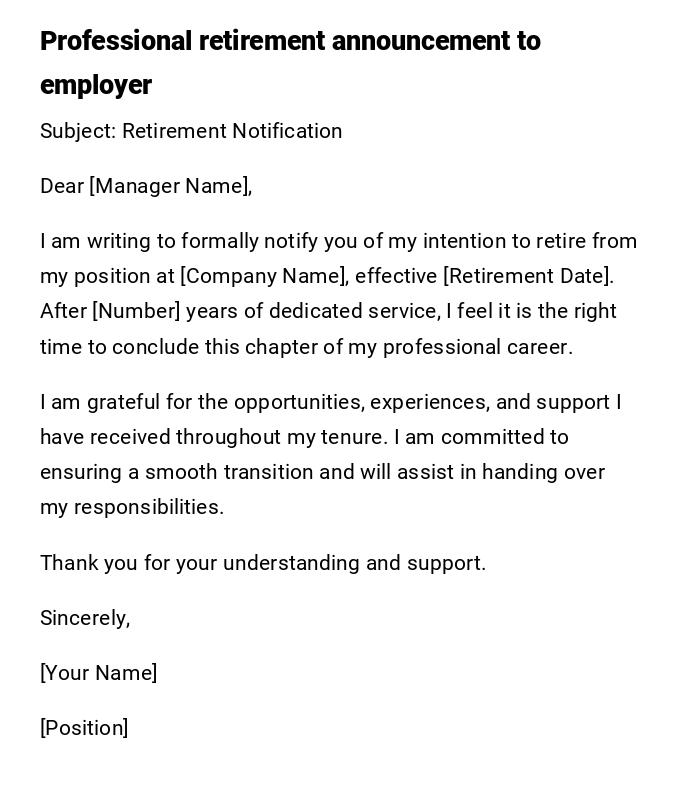
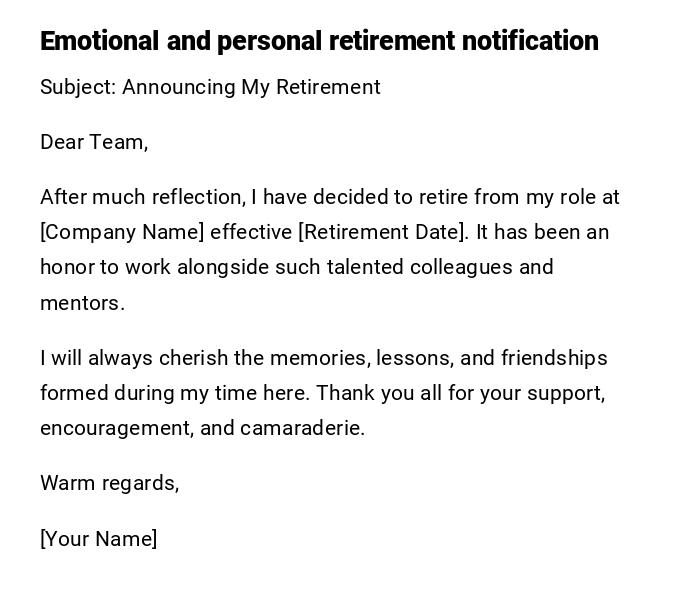
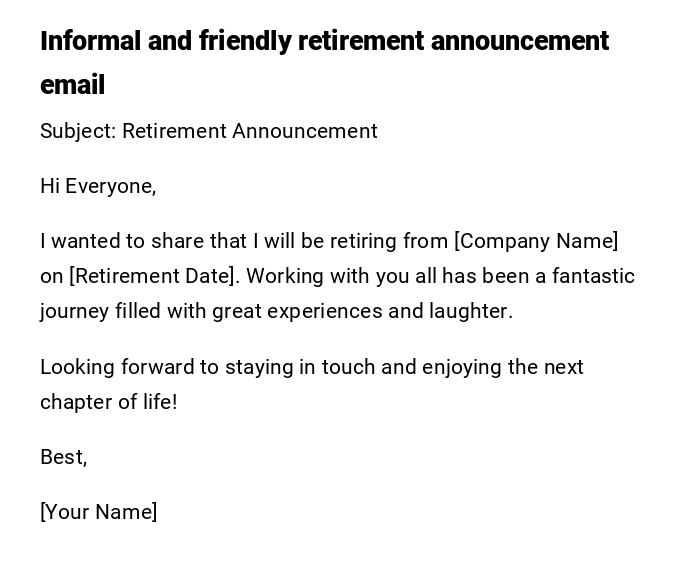
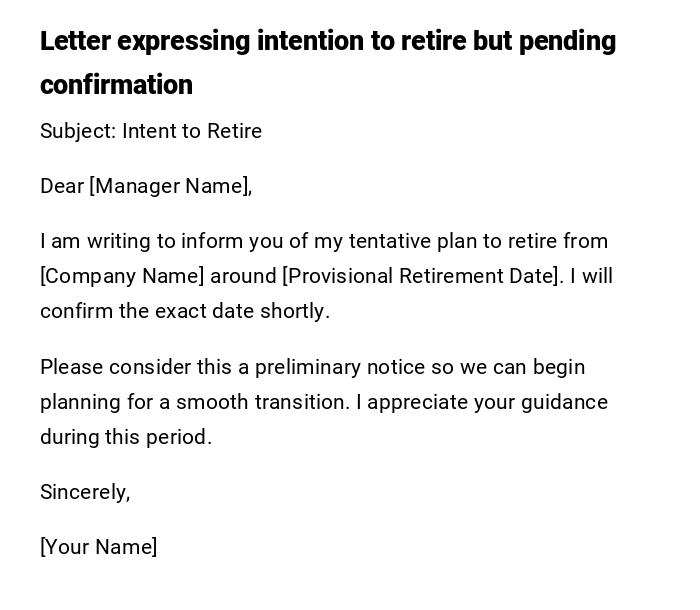
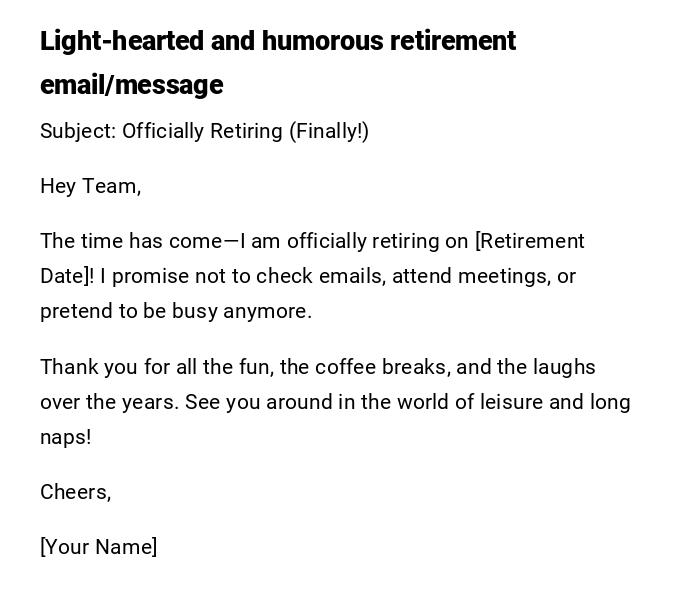
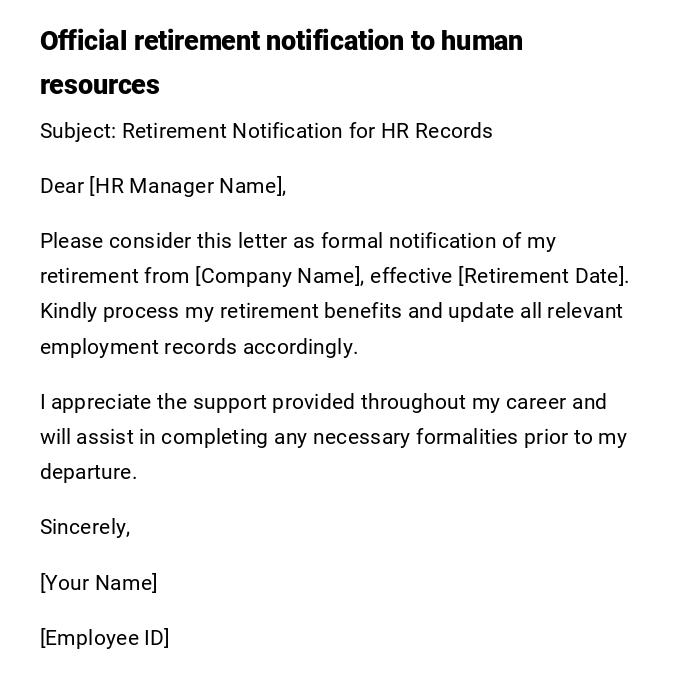

 Download Word Doc
Download Word Doc
 Download PDF
Download PDF